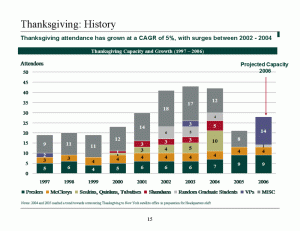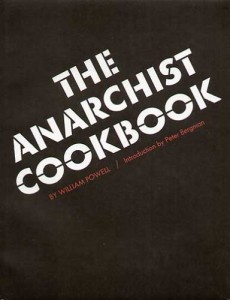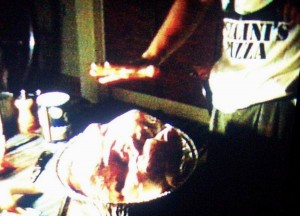Thanksgiving 2006 came and went, attended by friends, family and the customary dramas. An East Coast / West Coast feud flared up in the week before the holiday. Gabriel (East) sent what some in the West perceived as "a salvo across the bow" in the form of a PowerPoint presentation (a slide of which is pictured below). It contained a financial-style analysis of Thanksgiving: how Thanksgiving East has performed over the past decade, trends, projections, and outlines for future growth. Some saw this as evidence of a diabolical plan; I was naive and asked for clarification on specifics:
Dear Gabe, TYs (Thanksgiving years) 2003–2004 were characterized by broad guest sector diversification. What is the likelihood that a diversified strategy, with exposure to the Shanahan sector, for example, will be pursued in the future? Secondly, to what extent will "value" guests (e.g., McClorys and Preslers) continue to anchor the portfolio? Will you pursue more (potentially) volatile "growth" guests in order to boost performance in the coming years?
Gabe replied:

Like other mission-related offerings, we believe that diversification is important for ensuring steady, dependable performance in any environment to protect against sector-specific risk. But our commitment to diversification goes beyond our concern for the bottom line: indeed, we believe that it reflects our group's core mission. We are convinved that when we serve a broad range of attendants and when our offerings range across the geographic and social spectrum, our Thanksgiving is ultimately stronger.I want to emphasize that we consider all of our participants "core" candidates. Alas, our commitment to value–illustrated by our proven track record of offering Thanksgiving at a deep discount to its intrinsic value–means that we are not always able to serve as broad a constituency as we would like. For example, many of our sought-after participants fall outside of our geographic universe; we are particularly interested in opportunities in California.
Needless to say, this kind of talk elicited skepticism and cries of regional pride among the West Coasters, feelings which became even more acute when additional news arrived: The East Coast guest list had grown so large, so ginormous, that the hosts scrambled to find larger accommodations for their dinner.
Now [East Coast Thankgiving] reports that their 2006 expansion plan has been so successful that they're relocating to a BAR for their festivities. clearly the bar has been raised. are we going to let presler corp. outdo us at what we do best? we have to rally around the turkey and show the east coast who rules this holiday.
Would cooler heads prevail? Some West Coasters called for "focus."
i hate to say it, but this whole thing reeks of a ploy to take us off our game. start chasing the presler-yamadas with this whole thanksgiving at the bar thing, and next thing you know you'll be doing blow off some stranger's anatomy at 5am while realizing that you forgot to even *buy* a turkey. we have to stick to what got us here. the fundamentals and an easy-going attitude that there's no reason to get stressed out because our moms are at least like a thousand miles away … focus, people.
Of course, Thanksgivings of yore were characterized by spontanaeity that often resembled chaos. (See right. More here.). To this end, there were appeals to pull together:
If Robert Altman taught us anything it's that great works of art are NOT created with scripts, business plans or PowerPoint presentations. We will honor his tradition and follow our usual free-flowing, improvised pattern. We will create a richly layered Thanksgiving that will touch on all of the major themes of modern life in a heartbreaking, at times comical, at times violent, but always incisive way. Like Altman, we are not afraid of failure. However, it's also true that some great works of art were created with blow (John Belushi, the DeLorean, Dwight Gooden) …
In the end, there was focus and togetherness on the West Coast, and, by all accounts, steady growth with dividends in the East. A wise man once said: "Let love rule." It shall.





